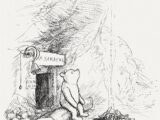The Big Picture –
By Glynn Wilson –
ARGO, Ala. – You want to know a secret?
Sure you do.
Everybody wants to know a secret.
Knock, knock
Who’s there?
Santa Clause and me
Who’s me?
Jesus
No room at the Inn
A color line even then
How lives intertwine.
So Santa, I have a confession. Not too salacious, at least not this one.
It took me many years, across many rivers and streams, to get back here and realize the full connection. It is a stark reality and includes some dark undertones of American life in the 21st Century, which we shall try not to dwell on in these last days of Christmas, democracy and the world as we knew it – yesterday.
Not a year ago or a decade. Not a century or a millennium. The accelerating nature of change is exponentially inevitable. Things change every day now, no every hour. Every minute now, even when you are fast asleep it is changing. The programmers are hard at work, strung out on the speed of meth, writing that code that will make our world look and work differently every chance they get. Every second. The machines of change grind this way and that, pushing the fragile gears to the breaking point. Like an over worked oil drill in the deepest water in the ocean pushed to the limit just to see how much pressure it can take. Until the concrete fails and the valves blow out, filling the sea with oil and death.
No matter how many disadvantaged Americans who broke out and broke through in this messed up, ever changing landscape like a screen savor on a computer screen, there are millions with just as much talent and soul who also worked hard and jumped on the bus and almost made it, so to speak.
There was even a film about Rolling Stone magazine covering the rock and roll road called “Almost Famous.”
Time is slipping away. As we know it devours all things, eventually.
Where to begin. Perhaps not at the beginning. That would take too long.
Here then, a thought.
One day I realized a simple truth. It could have been inspired by a god, but more likely not. Just tuned in human cognition. Call it “woked” like MTG if you must, even though that is not even a word. The word is woke, which by the mid-20th century had come to mean ‘well-informed’ or ‘aware’, especially in a political or cultural sense. But you know what happens when reading stops, and the people are left to get their information from rumors and shadows, as was the case in the Dark Ages and beyond.
But here is one hard truth of life. Not every great basketball player, football player, baseball, hockey, etc… makes it big in the pros. Same with musicians, artists and even writers, photographers and yes journalists. No matter what anybody tells you, that you can be and do anything you want, probably comes from a family who could afford to make it happen.
Of course there are physical realities to consider, which this analyst believes should be included in the speech.
“Yes, you can be just about anything you want to be. Unless your dream is to play in the NBA and you are only five feet six inches tall.”
There are not many five-foot six inch tall guards in the NBA any more. Talk about change. My own tennis skills were good enough for college, but without the family support resources, the bigs would have to remain a dream except for the John McEnroe’s of the tennis world. For those of us who didn’t come from tennis families per se, the struggle was harder no matter what you felt called to do. Play the drums or guitar, or to make it as a writer, you had to put in the time and the work – not skate by on a name or bank account.
Many millions in the country and on this planet do not see it that way anymore, although many still try. Some succeed. But make no mistake, being born on the right side of the tracks always had its advantages. The wrong side of the tracks or the town, well you know the story. Literature is full of reflections on this very power struggle for status humans seem hard wired to engage in, many times at their peril. Think Shakespeare’s “Romeo and Juliet.”
Wayne Perkins even wrote and recorded a song along this theme that no one’s ever heard. Until now.
It looks like the American Dream bubble is once again about to take a blow and burst, just like it seems to do every few years. When will it all end?
Let me recommend the streaming series on Ceasor’s rise and fall in Rome. You know how that ends. He’s stabbed in the back on the Senate floor by his own public allies in the Senate. But that’s a story for another day.
My long-time friend Wayne Perkins from my hometown did make it in a way, to the bigs as they would say in baseball. “He made it to the show.”
But while the show must go on, it may pass you by, as any star who has fallen will attest. Maybe his story is sort of like a quarterback who gets hit and develops a bum knee, cutting short a career. Joe “Willy” Namath comes to mind. Or a great musician who gets sidetracked by any number of diversions or accidents, or crisis – just trying to figure out how to deal with all these changes in the world. The ones Bob Dylan sang about.
Then came the newer, even scarier changes. The kind that drove everyone indoors and out of the crowds.
At some point after being ahead of your time your whole life, it becomes a leap of faith to simply hang on to the horse on the Ferris wheel or whatever ride on the tide we might have left in us all.
Part of my realization came one night when I first blew in to Birmingham from Washington the first time, in 2005. I noticed a new bar in the little shopping center near the corner of Sunhill Road and Carson Road, across from the old Queensbury Apartments, just across the street from “Jeff. State,” as we called it. The bar was called “Bubba’s” I kid you not, almost just like the one in my dreams from those summers by the pool across the street in 1979-80. The owner turned out to be Greg Straub, keyboard player for the Alabama Power-Crimson Tide band.
I walked in one night and ordered a drink, and it seems it was around Christmas time, and my mom was not feeling fine. I figured it was a short drive to the old house, a place to have a beer for momentary escape without having to brave the city street cops to and from Southside. Who knows, maybe I’ll run into some old friends, I remember thinking.
I must say it was a bit of a shock, if not necessarily a surprise, to see Dale Perkins on drums, J.J. Jackson on bass, Bob Delander on guitar – the old Alabama Power Band with no cover charge! By damn still banging out covers and requests from a song list of 700 songs, J.J. bragged that night over a beer on a break. I loved working with that tough old man. One day I will tell J.J. stories.
But today in a very sympathetic and empathetic frame of mind, I’m wondering how it seems we ended up in the same boat in a way, in an overlapping time frame. God knows I got some innings and seasons in the bigs, baby, another “time of my life” – as a free-lance contract player. Only my careers developed more slowly, traveling over mountains of success, but ultimate heart ache on the other side, like often happens in our intertwined lives.
I suppose my peak came back in what was left of 20th century thinking and newspapering up to about 2005, when the real trouble started, working for The New York Times out of New Orleans.
Then I chased web journalism’s revolutionary tide on the front lines. But I see it crumbling away bit by bit into the abyss of chaos, disorder and confusion, what is about to pass for government and a communications system in the coming days.
Watch the streaming series out on Ceaser’s rise and fall as dictator of Rome. You remember what happened to him. His own Senators stabbed him in the back, literally on the floor of the Senate. Take that tyrant. But never mind politics.
Maybe it’s like Wayne in a way, who created all those magical guitar parts in all those hit songs for so many great artists – in such a short time frame – working as a staff or contract studio musician, paid by the hour or the week. They were the Swampers, cooking up the Southern gumbo groove for backing the big stars who had to give Muscle Shoals a try as a place to create hit records. Unless those Swampers toured with the bands, they made nothing else from those hit songs.
As a free-lance reporter, writer, photographer, whatever, you get paid by the hour for the time on the job, hopefully plus expenses. There’s no union retirement fund for Southern writers or an Old Folk’s Home for down on their luck, retired or out of work journalists.
Although back in the day, we used to dream and joke about creating such a place, about 25 years ago over Friday lunch in N’awlins, picking the fried chicken out of our teeth. It was to have a nice but easy to walk golf course and a staff of Heineken girls, and we’d call it the Skippy Dog Country Club, exclusively for retired or out of work and in need writers, editors and photographers – and their girlfriends of course. The signature dish at the clubhouse bar and grill would be the footlong Skippy Dog chili dog with mustard and shredded American cheese on a soft, wheat bun.
I’ve heard tale of a writer’s union in New York, but no one has ever asked me to join. The big news publishers kept the unions out of the South. We couldn’t have that down here in the swamps of Alabama, which run red like blood still sometimes at sunset if you happen to have a view of the water and the right camera. Cherokee descendants and the Creek know what I mean.
This fall before the election I sat in an open field plugged in to power surrounded by a hillbilly-hippie concert venue called The Farm, 160 acres bordering the 1.5 million acres making up the Mark Twain National Forest in Missouri. I felt a little like Twain expressed in the 20th century.
“The 20th Century is a stranger to me,” he wrote in his Notebook once. “I wish it well but my heart is all for my own century. I took 65 years of it, just on a risk, but if I had known as much about it as I know now I would have taken the whole of it.”
Ode to Mark Twain: The 21st Century Feels Like A Stranger to Me
Another part of the secret lies in an alternative code to live by on the side of altruism over the selfish gene, unlikely to be successful in the short run, yet set down once in an acclaimed poem never the less: Knowing How Our Lives Intertwine.
Stephanie Kaza, professor of environmental studies at the University of Vermont and author of The Attentive Heart: Conversations With Trees, wrote a series of laws not so unlike the vaunted Ten Commandments.
Knowing how deeply our lives intertwine,
We vow not to kill.Knowing how deeply our lives intertwine,
We vow not to take what is not given.Knowing how deeply our lives intertwine,
We vow not to speak falsely or
deceptively.
The final secret, and part of the riddle, my friends, is that no matter how much magic you have seen rise from the stage, the page or the screen, or how much magic you have created with your own hands and mind on a wooden guitar or keyboard, time eventually envelopes us all. How do we make it while we’re here? Sometimes the answer is, my friends… Thanks in part to John Lennon and Joe Cocker, who Wayne also played with, there is a song about people having troubles from time to time and how our lives interact and intertwine, just like mine and Wayne Perkins and yours. That could make at least a chapter in a book, as the travel spirits led me back to this place, on this story once more.
You know what they say and sing. Love your neighbor, help those in need if you can.
“Maybe we get by with a little help from our friends.”
If you support truth in reporting with no paywall, and fearless writing with no popup ads or sponsored content, consider making a contribution today with GoFundMe or Patreon or PayPal.
















This is a poignant piece that probably hits home for more than a few. I was a workaholic throughout my career which encompassed anything and everything developing in media… news, programming, free form rock, instruction, print, psychographics, you name it. Constant travel and 80-hour work weeks were the norm. We didn’t have the sensory overloads we have today. It was in the late 1960s when I read Alvin Tofler’s Future Shock. Welcome to the sh*tstorm. Please don’t throw in the towel.
Always enjoy your work! Happy Christmas Sir! 🩷